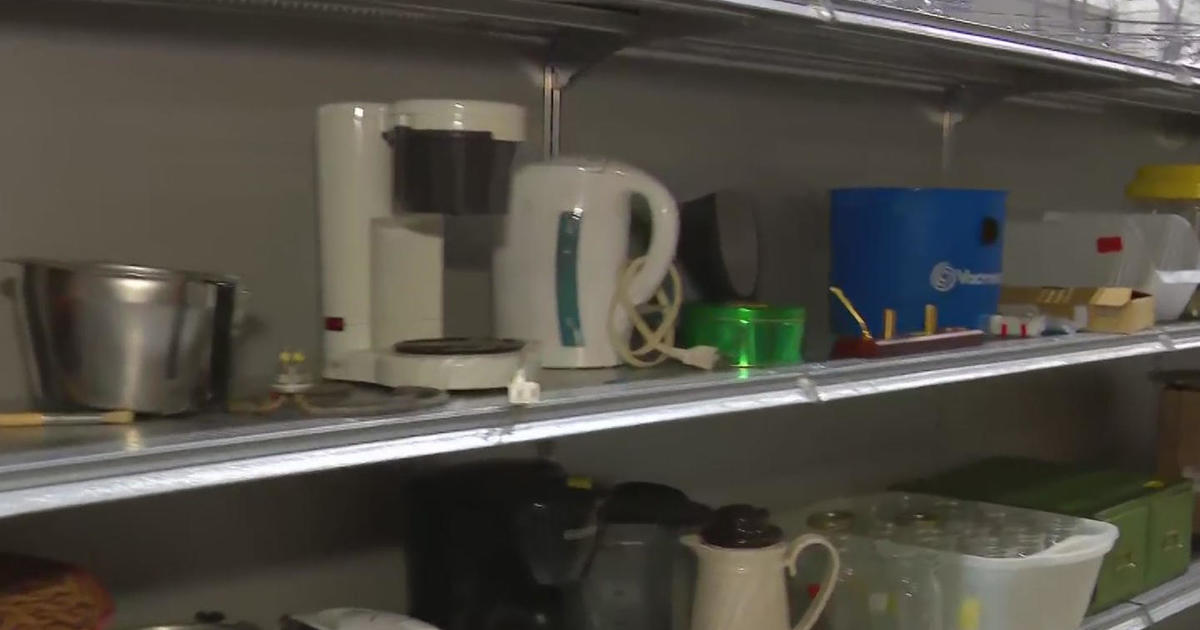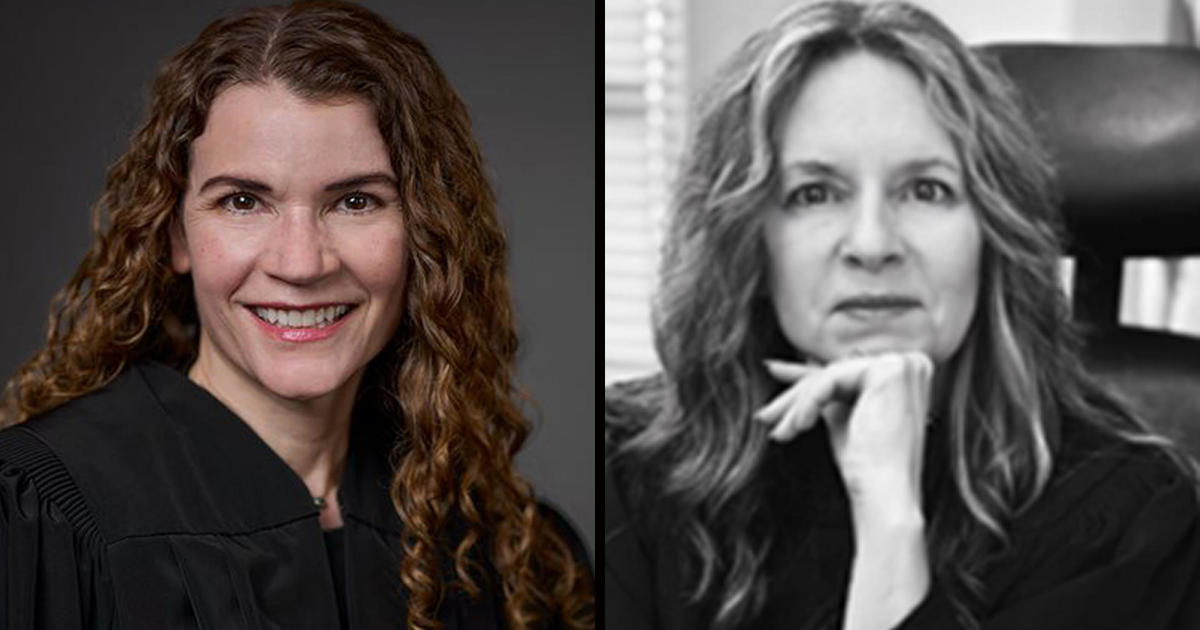MNfusion: Local Playwrights, Actors Talk Women's Theater Festival
Following Women's History Month in March, St. Catherine University created the first-ever Women of Substance Festival. The inaugural theme: "Charting a Course: Women's Journeys."
The festival began on Friday, April 15 and featured a variety of speakers, lectures and programs designed to empower women of all ages.
World explores like Ann Bancroft and Liv Arnesen shared their stories with audiences, art exhibitions featured strong female artists and female-centric works and several female authors shared their stories with readers.
There were also several performances by local musicians.
To end the-week long festival, St. Kate's is highlighting women in theater with a mini Women's Theater Festival.
The mini-theater festival features three unique performances, all with a different perspective of what it means to be a woman.
Heather Meyer kicks off the festival with her show "Women's History Month: The Historical Comedybration (with fabulous prizes.)" A combination of sketch comedy and game show skit that takes a humorous look at women's history in the United States.
The second show is written by Lao-American playwright Saymoukda Duangphouxy Vongsay and Hmong American playwright May Lee-Yang. Their show, "Hmong-Lao Friendship Play OR Lao-Hmong Friendship Play" looks at how two women from different cultures create a bond after experiencing similar circumstances.
Then, the festival ends with Allegra Lingo's "Genealogy of Happenstance."
Lingo's show tells the story of what to expect before you're expecting. She explores the journey to getting pregnant and what it's like to be the woman not expecting.
Lingo, Meyer, Vongsay and Yang shared their thoughts on what it's like to be a woman in the arts and why it's important for festivals such as these to exist.
---
So, let's start with an easy question. How long have you been involved in Twin Cities theater?
Lingo: I started working for the Minnesota Fringe as a box officer in 2000, and that was my entrance into the Minnesota theater scene. I worked for the Fringe through 2014, the last seven years as the Director of Audience and Volunteer Services. I began writing work for the stage (nearly always premiering at the Minnesota Fringe) in 2005, hooked up with the group "Buckets and Tap Shoes" beginning in 2006 as their saxophonist and then founded the performance collective Rockstar Storytellers in 2007.
Meyer: Ten years, I moved here after working in regional theatres. Once I got involved with improv and sketch comedy in Minneapolis, I just didn't leave.
Vongsay: I was a poet and prose writer before I wrote plays. In 2010, I co-founded The Unit Collective of Emerging Playwrights of Color and learned about theater-making from the other playwrights who are more established than I was. In 2011 I received a theater fellowship through Theater Mu and Jerome Foundation. They produced my first full-length play "KUNG FU ZOMBIES VS CANNIBALS" in 2013.
Yang: I got my first acting gig in 1997. I was hired to tour a play called "Hmong Tapestry: Voices from the Cloth." Even then, I didn't think of myself as a theater artist. I received my first Many Voices Fellowship at the Playwright Center around 2001. Even then, I didn't think of myself as a theater artist. It was until 2007 that I began intentionally doing theater--both writing and performing.
It's amazing to hear all the different stories that brought you women in to the Minnesota theater scene! I'm sure these answers are all as eclectic, but tell me, what was the inspiration for each of your shows?
Lingo: I was writing my thesis (a book length manuscript) for my MFA in Creative Nonfiction writing at Hamline University beginning in summer 2013, right about the time my wife and I decided to start trying to make a family. I was bouncing between a number of ideas for awhile, and then I realized that what I really wanted was a well-written book (not something off the pregnancy or self-help shelf) to read about someone's journey to make a family. I couldn't find one. So, I decided that if I had discovered a hole in the market, right at the time when I was starting to write a book for my degree, I should probably do it. Not long into the process I realized that the material might make a really good solo show, so I adapted the book into a show. And here we are!
Meyer: I wanted to create a comedy show about a holiday that require lots of women in the show, mainly to give myself something to write and perform in with my favorite fellow artists. Then I realized a comedy show about Women's History Month would have to have women roles in the show. This was perfect fodder for me as a comedy writer because Women's History is frequently treated as "special," "delicate" and "put on a pedestal." We set out to create a show that celebrate women in history but was still a comedy show. This show is about it being OK to laugh with and at women in history as we do men in history, that's truly equality.
Yang: Mooks and I are real-life friends. For years, we said we should work on a project. Then, 2015 marked the 40-year anniversary of the Hmong and Lao migration to the U.S. It was a good excuse to put our ideas into action. Plus, we thought we were funny and needed a platform to talk.
It's always fascinating to learn what real-life events lead playwrights to create their work. So tell me, why was this festival something you wanted to be a part of?
Lingo: The Women of Substance series is a fantastic celebration of women in many disciplines to bring their work to an audience in an academic setting. Also, because the gift of knowledge and learning is so important to me, I jump at any chance to bring what I do to this type of setting.
Meyer: "Women's History Month: The Historical Comedybration (with fabulous prizes)" is my favorite creative project. The cast of Leslie Vincent, Shannon Troy Jones, Kelsey Cramer, Emily Schmidt and I have been working together for four years creating this show and performing it each March. We love sharing it with people. Each time we do the show we have sketches with new historical women in them. I think this show helps people see that Women's History is robust and not a sacred thing that can't be fun. But we make it fun. We give out party hats to the audience as they come in, so they know it's not going to be boring.
Vongsay: Women creating spaces for women is empowering to me. If we are not our own cultural producers, who will be?
Yang: It was definitely an honor to be asked to be part of the festival. I love the idea that St. Kate's is not only honoring women's stories but also being intentional about a line up of women comedian/storytellers. Often, when I think of women's festivals, I feel like we have to be deep -- which means we have to be serious. I love the idea of having fun while embracing deeper topics.
I think it is so true that all of these stories can only help empower women, and to be the females telling them is an exciting thing! Tell me, why did you all choose the specific shows you did to be the ones featured in the festival?
Lingo: Since its first performances at the 2014 Minnesota Fringe and then a run at the Dowling Studio at the Guthrie Theater in September 2015, this show has been sparking so many conversations. It's a narrative that really isn't talked about in a public setting. I think it's a good idea for a wide variety of narratives and types of performance to be included in a festival environment, and I'm happy to have a chance to do what I do.
Meyer: It's the most fun way to celebrate women in history! Also there are fabulous prizes.
Allegra, as your show has to do with pregnancy and motherhood, have can women who aren't mothers, or men, relate to the show?
Lingo: I think Brad Richason in his City Pages review of the show said it better than I could!
"A gifted storyteller, Allegra J. Lingo has a proven knack for connecting with diverse audiences through the sharing of deeply personal accounts. This empathetic skill is particularly pronounced throughout her heartfelt solo show, The Genealogy of Happenstance, in which Lingo and her wife endeavor to start a family. Along the way, Lingo details a procession of set-backs and victories, generously sprinkled with social absurdities, from locating a suitable sperm bank to experiencing the process of artificial insemination. The work's biggest focus, however, is Lingo's drive to define her role as the non-biological parent in the impending child's future. At first glance, Lingo's situation might seem unique to same-sex couples. But the anxieties triggered by parenthood are universal, as the hope of any couple is to usher a new life into the world.The show was enormously popular at the 2014 Fringe Festival, and this Guthrie Theater reprisal offers a timely reminder that the need for family remains a trait indicative of a shared humanity."
Why do you think there hadn't been any literature on the topic before?
Lingo: I think it's a combination of the fairly puritanical culture that is America and a reluctance to talk about anything that would be considered taking place in the bedroom. And, partly, because we as humans value privacy. But the result of that attitude is that many people who experience bumps in the road toward starting a family feel very alone and have no outlet for their stress because no one is talking about it. So I think there's merit in trying to get the narrative out there.
I agree. I think it is extremely helpful for people to know that they are not the only ones who have experienced troubles during a time that is supposed to be very exciting. Tell me, what was the response that you received after writing the book/show?
Lingo: The book in still in-progress, so I can only talk about the show. But, the response has been incredible. I've had many conversations with people who want to share their own story with me, and I am humbled by that. My favorite response came just a day after the first performance of this show at the 2014 Minnesota Fringe. I was outside a theater, and a woman I didn't know came up to me and said, "I saw your show on Friday. I have depression, and have been in a very deep depression for a while now. Your show was the first time I felt any kind of emotion in four months. So, thank you for allowing me to feel again." If I had never performed the show again, I would have been completely satisfied. I knew I put some good in the world.
Wow! That is a amazing. It must be such a wonderful thing to know your working is touching so many people. So, Heather, tell me how did you come up with the format to your show?
Meyer: My favorite type of comedy is sketch comedy, so it was a natural fit. I also wanted the title of the show to immediately say what it was – a comedy. I invented the word Comedybration to tell you it is funny but also a celebration. And of course, I added fabulous prizes to get the audience really excited. In the show we have a game show where audience members have to participate in historical women themed games we've invented to win fabulous prizes. Well, or as fabulous as our budget allows. It was also important to me that we include a male-identified performer in the cast because I wanted to illustrate the Women's History is for everyone, not just women.
That's great! I think it is invaluable to bring men along in the conversation. So, why do you think it's important to highlight women's history?
Meyer: Women's history is a part of all history. We have the opportunity to fill in the gaps where women have not been highlighted previously. Our show does it in a welcoming, happy, positive, funny way. Which is my favorite way to do anything.
That's great! So, is there one fact in the show that people have told you they didn't know before seeing it?
Meyer: Sojourner Truth was six feet tall
Wow! I don't think I knew that either! So, Saymoukda and May, how can people of all ethnicities and races identify with this show?
Vongsay: If you take away the "Hmong-Lao" in the title of our play, it'll simply be THE FRIENDSHIP PLAY. I think that is pretty easy to relate to.
Yang: One of the pitfalls of being an artist of color and a woman AND having a show title like ours is that audiences sometimes think they have to be Hmong or Lao to attend. Or they have to be Hmong or Lao to understand the contexts. One of the consistent responses I've gotten from people is that they were able to connect to our work in different ways: perhaps an audience member has an affinity towards 80s music or they loved Little House on the Prairie like me too. Some people will come for the humor. Some people will come because they're interested in learning about cultural things. Basically, there's something for everyone. If I go see a Shakespeare play, I never think about, "How can I connect to dead English people?" I go because the story seems interesting or I go because I want to know what the hype is about. It is only by putting yourself in the seat can you figure out your own connections to a show.
That is a wonderful way to show that as audience members we should always be open to taking in any show because there is always something to grasp onto. So, in that same vein, what does it mean to be able to share stories of women of different cultures?
Yang: For me, this is about diversity and representation. If you don't see diverse representations of stories out in the world, it is easy to stereotype people and de-humanize them. If you don't see diverse representations, it is easy to say, for example, that women don't do comedy. People have had the gall to tell me, for example, that my play "CONFESSIONS OF A LAZY HMONG WOMAN," was not accurate because Hmong women aren't like that. For strangers to tell me that my real, lived experience is untrue tells me this: they have a stereotype of who they think I am. Any complexity I might have as a person cannot exist. To have my humanity denied is not cool. That's why we need a diversity of stories and storytellers, [both] on and off the stage.
I'm glad that you are a voice in that fight to share these stories because it is so important for the reasons, and many others, that you listed. So, for you playwrights, what does being a woman in theater mean to you?
Lingo: It means I get to be me.
Meyer: I need to write the stories that I want to hear. As a playwright, I write my scripts thinking of "what great roles could I create for women in this script?"
Vongsay: I am a Lao American woman refugee playwright. As far as I know, I'm the only Lao American playwright in the Midwest whose work has been produced by a major institution. I'm lucky that I have had the support given to me so far because even within my own ethnic community, my practice is seen as frivolous. And with each opportunity that I get to learn from and do this work, it's a push back to the expectations placed on me.
Yang: There are many identities I wear: Hmong, Asian American, nerd, romance novel aficionado and foodie – just to name a few. Woman is just one of these identities. But how all of these things affect me as a theater artist is this: I can't create a piece of work in a silo. I'm always thinking about: who do I want to see this, how do we get them in the room, how do I respond to backlash and criticism? I don't have the luxury to just be an artist who puts work into the world. I have to be responsible for other parts of the process.
I'm struck by how poignant each of these answers is, and how different they are from one another. I think tht is one of the wonderful things about this festival, bringing together female perspectives from all over. That being said, what do you hope people will come away from this festival feeling?
Lingo: I hope they learn something they didn't know before!
Meyer: Excited about all the great artists in the community! And wanting to follow Women's History Month: The Historical Comedybration (with fabulous prizes) on Facebook.
Vongsay: I would love for audiences to feel inspired and to feel that they too can inspire.
Vang: I hope people will find connections to the stories. I also hope people will have a good time. Theater should be engaging.
The Women's Theater Mini-Series is part of "Charting A Course: Women of Substance Festival." It takes place from 12 – 6 p.m. Sunday, April 24 at St. Catherine University. For more information, or to purchase tickets for any and all shows, visit The O'Shaughnessy online.



